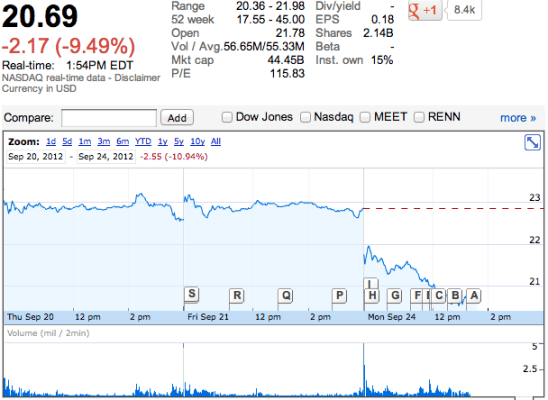On Saturday, the financial magazine Barron’s published a very damaging cover story against Facebook and its business model. The article doesn’t break any news about the company, rather it sums up all the negative points that Wall Street has been discussing since Facebook’s May IPO, in a way that seems to have struck a chord with Wall Street. The result is yet another difficult day for the stock (NASDAQ:FB). Currently, shares are trading at 9.49 percent below yesterday’s price. It rose slightly from a low of 20.36 to 21.07 at 3pm Eastern.
Facebook’s shares were up 25% after Disrupt two weeks ago and even at 21 a share Facebook is not hitting an all-time low.
Barron’s writer Andrew Bary explains that Facebook needs to completely change its business model in order to stay relevant. It cites mobile ads as an important challenge for the coming months. The magazine remains very skeptical when it comes to Facebook’s stock.
What are the shares worth? Perhaps only $15. That would be roughly 24 times projected 2013 profit and six times estimated 2013 revenue of $6 billion, still no bargain price.
According to Barron’s, the so-called app model doesn’t work well with Facebook because the social network needs to be open all the time and not checked every once in a while. It notes as well that lockup expirations could greatly affect the stock in the coming months.
In the article, investors and analysts openly criticize Facebook’s current revenue, stock-based compensations for employees and operating costs. The conclusion states “stay away from the stock.” Barron’s moves markets and the market, it seems, is listening.
Yet, as Barron’s compares Facebook stock with Apple, Google and Amazon stocks, the magazine forgets that those companies are very different and have been public for years and even decades. It goes so far as to suggest Facebook implement a paid subscription model. It’s fascinating to watch folks so clueless about social media opine so openly, but profits are profits to these folks, and if there’s none to be seen, the investors get edgy.
